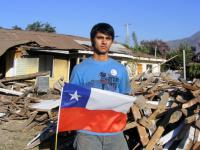-
DHS efforts to address EMP threats to the electric grid fall short: GAO

A report by the Government Accounting Office (GAO) found that as of July 2015, the Department of Homeland Security (DHS) has taken several actions that could help address electromagnetic threats to the electric grid. Although these are positive steps, GAO says that its preliminary work indicates that DHS has not effectively coordinated with stakeholders to identify critical assets or collect necessary risk information, among other responsibilities.
-
-
Trend continues: April 2016 the seventh consecutive warmest month on record
April 2016 was the warmest April on record for the globe, according to NASA. every month from October 2015 to April 2016 has now been warmer by 1 degree Celsius or more above the 1951-1980 average. Parts of Alaska, Russia, western Greenland, and northern Africa had a temperature deviation of at least 4 degrees Celsius above the April average.
-
-
The physics of the walking dead: Scientists study the spread of zombies

Zombies, with their appetite for the living and their ability to transcend the boundaries of life and death, have captured the imagination of audiences for centuries, and it seems that even physicists cannot resist the appeal of these reanimated corpses. Ateam of researchers has taken mathematical models commonly used to understand traditional disease outbreaks and added a supernatural twist.
-
-
Flooding, rainfall extremes in cities to rise as climate changes
Cities face harsher, more concentrated rainfall as climate change not only intensifies storms, but draws them into narrower bands of more intense downpours, engineers have found. This has major implications for existing stormwater infrastructure, particularly in large cities, which face higher risks of flash flooding.
-
-
Japan’s successful earthquake early warning system offers lessons to U.S. high-speed rail
As California and other states move forward with high-speed rail plans, some have questioned the system’s ability to withstand earthquakes. This is especially critical in California, an active quake zone. A recent research report says that valuable lessons are easily adapted from Japan’s successes with its early earthquake warning (EEW) systems. This was most recently demonstrated during the series of violent quakes that shook Japan in mid-April, 2016.
-
-
2015: 28 million people forcibly displaced by conflict, 19 million displaced by disaster

Conflict and violence internally displaced 27.8 million people in 2015. The number of people internally displaced by disasters in 2015 was 19.2 million in 113 countries. Additionally, at least a million people were forcibly displaced by criminal violence in Mexico and Central America, and tens of millions more by development projects such as dams and urban renewal projects.
-
-
Governor Brown issues order to continue water savings as drought persists
Moving to bolster California’s climate and drought resilience, Governor Edmund G. Brown Jr. the other day issued an executive order that builds on temporary statewide emergency water restrictions to establish longer-term water conservation measures. The governor’s office says that Californians have responded to the call to conserve water during the drought by dialing back sprinklers, replacing lawns, fixing leaky faucets, and installing more efficient toilets and washing machines. Between June 2015 and March 2016, Californians reduced water use by 23.9 percent compared with the same months in 2013 — saving enough water to provide 6.5 million Californians with water for one year.
-
-
Floods, coastal erosion may expose contents of UK landfills
The contents of historic coastal landfill sites in England and Wales could pose a significant environmental threat if they erode, according to a new study. The main risks to these landfills come from the effects of climate change, including erosion and flooding with salt water from storm surges and higher water levels.
-
-
Worries in southern California: San Andreas fault “locked, loaded, and ready to roll”
Top seismologists have warned residents of southern California that the region is overdue for a major earthquake. The San Andreas fault is “locked, loaded and ready to go,” said Thomas Jordan, director of the Southern California Earthquake Center. Meanwhile, in the Pacific Northwest, Mount St Helens is waking up, with as many as 130 small earthquakes detected beneath the mountain in recent weeks.
-
-
Sea-level rise has claimed five whole islands in the Pacific: first scientific evidence
Sea-level rise, erosion, and coastal flooding are some of the greatest challenges facing humanity from climate change. Recently at least five reef islands in the remote Solomon Islands have been lost completely to sea-level rise and coastal erosion, and a further six islands have been severely eroded. This is the first scientific evidence that confirms the numerous anecdotal accounts from across the Pacific of the dramatic impacts of climate change on coastlines and people.
-
-
Insect outbreaks reduce severity of wildfires
Forest scientists have found an unexpected silver lining to the insect outbreaks that have ravaged millions of trees across western North America. While insect outbreaks leave trees looking like matchsticks, a new study finds these hungry critters significantly reduce wildfire severity. The findings contrast sharply with popular attitudes — and some U.S. forest policies — which connect tree-eating insects with increased wildfire activity.
-
-
Climate-driven water scarcity could reduce economic growth by up to 6%: World Bank
Water scarcity, exacerbated by climate change, could cost some regions up to 6 percent of their GDP, spur migration, and spark conflict, according to a new World Bank report released the other day. The report says the combined effects of growing populations, rising incomes, and expanding cities will see demand for water rising exponentially, while supply becomes more erratic and uncertain.
-
-
Climate-exodus expected as temperatures rise in Middle East, North Africa
More than 500 million people live in the Middle East and North Africa — a region which is very hot in summer and where climate change is already evident. The temperature during summer in the already very hot Middle East and North Africa will increase more than two times faster compared to the average global warming. This means that during hot days temperatures south of the Mediterranean will reach around 46 degrees Celsius (approximately 114 degrees Fahrenheit) by mid-century. As a result, the number of climate refugees could increase dramatically in future.
-
-
Chile quake information expands disaster and failure data repository

27 February 2010, is a date that most Chileans will probably never forget. On that day, the sixth strongest earthquake in recorded history — packing a force greater than the most powerful thermonuclear device ever tested — occurred off the country’s central coast. Now, thanks to a newly available set of data collected in the aftermath of the disaster, NIST is providing Chile and other quake-prone areas worldwide with a powerful tool toward becoming more resilient to future seismic events.
-
-
A rising tide of migration
“With sea levels on the rise, several island nations are scrambling to stay above water and ensure citizens will have a place to go when the ocean engulfs their homeland. The humanitarian-crisis phase of climate change has officially begun” – these are the opening sentences of an article just published in the Columbia Law School Magazine.
-
More headlines
The long view
Strengthening School Violence Prevention
Violence by K-12 students is disturbingly common. Ensuring that schools have effective ways to identify and prevent such incidents is becoming increasingly important. Expanding intervention options and supporting K-12 school efforts in Behavioral Threat Assessment and Management (BTAM) would help.
Huge Areas May Face Possibly Fatal Heat Waves if Warming Continues
A new assessment warns that if Earth’s average temperature reaches 2 degrees C over the preindustrial average, widespread areas may become too hot during extreme heat events for many people to survive without artificial cooling.
Trump’s Cuts to Federal Wildfire Crews Could Have “Scary” Consequences
President Donald Trump’s moves to slash the federal workforce have gutted the ranks of wildland firefighters and support personnel, fire professionals warn, leaving communities to face deadly consequences when big blazes arrive this summer. States, tribes and fire chiefs are preparing for a fire season with minimal federal support.
